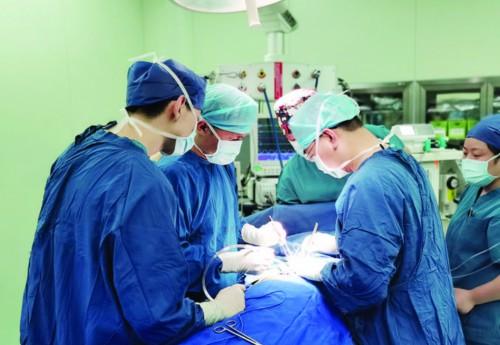
He Wei, deputy chief physician of the Department of Thoracic and Cardiac Surgery of CUHK (second from left), led a team to remove ECMO for patients
Acute fulminant myocarditis, cardiogenic shock, cardiac respiratory arrest 4 times, ischemic hypoxic encephalopathy, cardiac pulmonary edema, acute respiratory failure, heart, lung, brain, kidney, liver and organ failure... These fatal critical illnesses actually happened to a 7-year-old boy, Xiaofei (pseudonym). At the critical moment of life and death, experts from the Department of Critical Care Medicine and Thoracic and Cardiac Surgery of the Affiliated Zhongda Hospital of Southeast University rushed to the rescue of northern Jiangsu with the life-saving "artifact" ECMO (artificial heart and lung). Correspondent Liu Min Cheng Shouqin
Yangzi Evening News/Purple Cow News reporter Yang Yan
7-year-old boy with 4 cardiac arrests, on ECMO!
Not long ago, 7-year-old Xiaofei suddenly had nausea and vomiting, and the family took the child to the town hospital for treatment, thinking that it was a gastrointestinal cold, but after the infusion treatment, it did not improve, but the condition worsened, the child had cold limbs, breathing difficulties, purple lips, and talked to him for half a day before reacting. The family felt that something was wrong and rushed to the big hospital in the city. After examination, Xiaofei was diagnosed with fulminant myocarditis and was admitted to the intensive care unit for treatment. What is more critical is that Xiaofei has cardiac arrest, and then every 20 to 40 minutes, it appears once, a total of 4 times before and after. Xiaofei's life is in a hurry!
The local hospital urgently contacted the Department of Critical Care Medicine of the Affiliated Zhongda Hospital of Southeast University, hoping to save this young life. Huang Yingzi, vice president of CUHK Hospital and chief physician of the Department of Critical Care Medicine, led He Wei, deputy chief physician of the Department of Thoracic and Cardiac Surgery, and Wu Changde, attending physician of the Department of Critical Care Medicine, to the local hospital with ECMO as fast as possible.
"On ECMO!" Vice President Huang Yingzi and others immediately formulated a treatment plan. He Wei, deputy chief physician of the Department of Thoracic and Cardiac Surgery, and Wu Changde, attending physician of the Department of Critical Care Medicine, successfully activated ECMO for Xiaofei, stabilizing the child's heart rate, blood pressure and breathing, and winning valuable opportunities and time for further treatment. In order to let Xiaofei get better follow-up treatment, he was transferred to the Intensive Care Department of CUHK Hospital overnight to continue rescue. Racing against death, I arrived at CUHK Hospital at 3 a.m. the next day.
The five major organs were seriously damaged, and the life barrier was progressing smoothly
Although after the ECMO, the indicators of vital signs have improved, but due to the outbreak of myocarditis came too violently, Xiaofei has had multi-organ failure, the heart, lungs, brain and other five major organs have been seriously damaged, the whole person is in a coma. Xiaofei's later treatment still has many difficulties to overcome: the treatment of viral myocarditis, the maintenance and recovery of the functions of various organs, the management of "artificial heart and lung", the prevention and control of complications, and rapid rehabilitation treatment...
Finally, after 2 days of hospitalization, Xiaofei woke up; after 4 days, he resumed cardiopulmonary function and withdrew from ECMO; after 5 days, he resumed spontaneous breathing and withdrew from the ventilator; in 10 days, he resumed kidney function and withdrew from the machine of continuous kidney replacement therapy... The hearts that the medical staff and the parents of the children had been tugging at finally let go.
In order to make the child better cooperate with the treatment, the intensive care department tried to make the child happy, knowing that the child liked Ultraman, sometimes showing him Ultraman cartoons, and also gave him Ultraman toys. With the improvement of his condition, XiaoFei's appetite also soared, and the hamburgers and large meat balls were particularly fragrant to eat.
When XiaoFei's condition developed in a good direction, and the problems that had been worried about whether he could wake up and whether the multi-organs could recover did not occur, the last worry still appeared - complications. Li Qing, deputy chief physician of the Department of Critical Care Medicine of CUHK Hospital, introduced that the child's vital signs are stable and has been out of danger of life. However, it was found that he could not control the bowel movements on his own, and his lower limb movement ability was weakened, especially the muscle strength below the knee joint was weak, and he could not lift his legs. Through the consultation of neurology, pediatrics and other multidisciplinary experts, combined with the relevant examination results, acute transverse myelitis is diagnosed. Subsequently, Xiaofei was transferred to the pediatric department for treatment. After more than 20 days of related treatment, Xiaofei's condition gradually improved, the muscle strength of the lower limbs was restored to level 2, the legs could be lifted off the bed, and the effect of rehabilitation treatment was getting better and better...
Xiao Fei's illness is menacing, and the family has always wondered, isn't it nausea, vomiting, no spirit, how did it become life-threatening fulminant myocarditis?
Experts remind that patients with fulminant myocarditis often have some atypical cold symptoms such as fatigue, drowsiness, no appetite, etc. in the early stages, and the children and their families are easy to take lightly, and then the disease progresses very quickly, and some people have multiple organ failure after two or three days. Therefore, when the child feels flustered, chest tightness, and breathlessness, it is necessary to be particularly careful and should seek medical treatment in time. However, you don't have to panic too much, most people suffer from myocarditis is mild, and only a few people will develop severe myocarditis.
Source: Yangtze Evening News